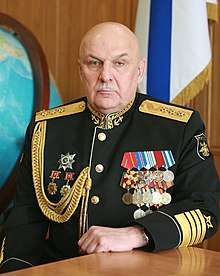Sergei Avakyants
Admiral Sergei Iosifovich Avakyants (Russian: Сергей Иосифович Авакянц, Armenian: Սերգեյ Իոսիֆի Ավագյանց; b. 6 April 1957) is a Russian naval officer and a recipient of the Order of Naval Merit and the Order for Service to the Homeland in the Armed Forces of the USSR.
Sergei Iosifovich Avakyants | |
|---|---|
 Sergey Avakyants | |
| Born | 6 April 1957 Yerevan, Armenian SSR |
| Allegiance | |
| Service/ | Soviet Navy, Russian Navy |
| Years of service | 1975–present |
| Rank | Admiral |
| Commands held | Russian Pacific Fleet, Russian Navy |
| Awards | Order of Naval Merit Order for Service to the Homeland in the Armed Forces of the USSR, 3rd class |
Biography
Avakyants was born on 6 April 1957 in Yerevan, Armenia and was a son of an officer. He graduated from Nakhimov Naval School in 1980 and took the Higher Special Officer Classes of the Navy from 1989 to 1991, and seven years later graduated from the Kuznetsov Naval Academy. He served in the Northern Fleet and commanded the missile and gunnery section of the cruiser Admiral Yumashev. He went on to serve on the missile cruiser Admiral of the Fleet Lobov, later renamed Marshal Ustinov. From 1991 to 1996 he was commanding officer of the same cruiser. By October 1996 he was a deputy commander and in 2001 commanded a missile ship division of the Northern Fleet. From 2004 to 2007 he became chief of staff of an Operational Squadron of the Northern Fleet. He took courses between 2005 and 2007 at the Military Academy of the General Staff of the Armed Forces of Russia and in June that year became chief of staff at Novorossiysk Naval Base of Black Sea Fleet. In August of the same year he became a deputy commander of both Primorye Flotilla and the Pacific Fleet. Since May 2012 he has been, by Decree of the Russian President, commander of the Pacific Fleet.[1] Between 26-30 July 2018 Avakyants hosted First Admiral Pengiran Dato Seri Pahlawan Norazmi bin Pengiran Haji Muhammad, commander of the Royal Brunei Navy on his first official visit to Russia.[2] In December 2018 he announced plans for the modernization of the Pacific Fleet, including modern submarines and surface ships, and the refitting of existing vessels to carry the 3M-54 Kalibr cruise missile.[3][4]
References
- "Sergei Avakyants". Ministry of Defence of the Russian Federation. Retrieved 27 July 2013.
- "Commander of the Royal Brunei Navy conducts first official visit to Russia". The Ministry of Foreign Affairs of the Russian Federation. Retrieved 12 March 2019.
- Soper, Karl (21 December 2018). "Russia's Pacific Fleet prepares to receive first Kalibr-equipped vessels". Washington DC: Jane's Navy International. Retrieved 12 March 2019.
- Xuequan, Mu (12 December 2018). "Russian Pacific Fleet to get new ships, submarines". Xinhua. Retrieved 12 March 2019.